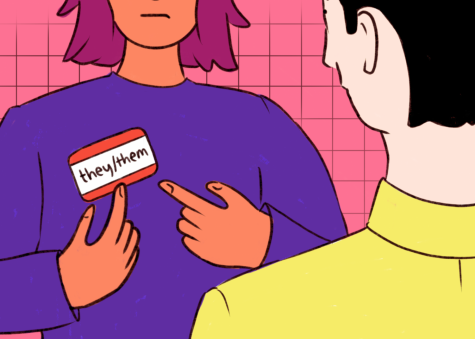Awkward: How to handle someone getting your pronouns wrong — again
April 21, 2021

“Now, everyone, take a look at Ezra’s work. He is a great example of …”
It does not matter what praise your teacher was going to sing about you. You tune out everything after you hear the word “he.”
It should not be that hard for your teacher to remember you use “they” pronouns, yet this is about the seventh time this semester he has made this mistake. How can you get through to him?
It should not be your responsibility to remind him every time he mentions you in class—after all, he remembers the names of all 24 students in the class, so he should be able to remember your pronouns too.
What do you do when someone keeps getting your pronouns wrong? The Chronicle spoke with relationship, communication and etiquette experts to find out.
In general
Among your circle of friends, psychologist and friendship expert Irene S. Levine said a great first step is explaining that the pronouns you use are how you see yourself and that you hope the person using — or misusing — them will respect your feelings.
If this person is someone you can avoid, and they continue to persistently use the wrong pronouns, she said, this person may not be a considerate or kind person, and you may not want to continue being close to them if they keep hurting you like this.
If you want to keep this person in your life and you are in a safe situation, Bonnie Tsai, founder and director of Beyond Etiquette, a social and business etiquette consulting agency, said you could keep wearing them down by reminding them over time. Or, she said you could have a conversation with them in which they explain why they won’t call you by the correct pronouns and you explain why they should, if you are willing to spend the energy.
In a professional setting
School and work are different than casual gatherings. You cannot avoid certain people like teachers, classmates, employers and coworkers because you have to see them every time you go to class or work.
Tsai said in a Friday, April 16 email to the Chronicle that in cases like this, if you want to remind the person each time, you can pull them aside and let them know the pronouns with which you would like to be addressed.
If you think they are putting in an honest effort, you can let them know you appreciate their efforts and that you understand it may take a short time to adjust, she said.
But there are situations in which that person may not adjust. Sylvia Mikucki-Enyart, relationship researcher and assistant professor at the University of Iowa, said in a Thursday, April 15 email to the Chronicle that if a person continues to use incorrect pronouns for you, you have the option to bring a supervisor into the situation or contact the human resources department.
If someone else is being misgendered
Allyship is important.
Tsai recalled a situation she heard of in which a brother used a blow horn every time his parents used the wrong pronouns for his younger sibling. And while not every situation can be that outlandish, if you see another person using incorrect pronouns for someone, there are ways to help.
Tsai said you can pull aside the person misgendering someone and let them know what they’re doing is wrong. She said it’s important you don’t make them look bad by criticizing them in front of everyone because they will be less receptive to your advice.
Mikucki-Enyart said you could simply restate the sentence using the correct pronoun. For example, if someone said, “He is the right person for the job,” you could say, “They are the right person for the job.”
And if you are questioned about it, you can further explain the person who is right for the job uses “they/them” pronouns. However, Mikucki-Enyart said this also should be done in a private conversation.
Ultimately, if you are someone whose pronouns are being misused, and you can remove yourself from that situation, Tsai said you should try to do so.
“I don’t believe it’s worth your time spending it with people who don’t respect [you],” she said. “Maybe it’s better to just remove yourself from the situation and spend time with friends and family that respect who you are.”







